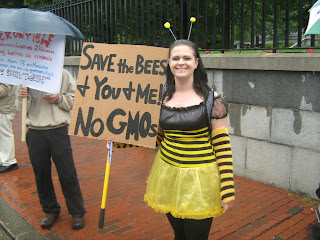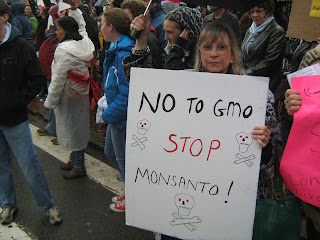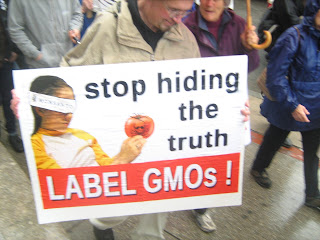Monsanto is a large multinational corporation originally
founded as a chemical company but has now transformed into a mega-industrial
agribusiness biotechnology company. They are the makers of a dozen health-and-environment damaging chemicals such as Agent
Orange, which was heavily used in the Vietnam War, DDT, and Roundup (glyphosate), the most popular herbicide in the US today. They are also a leader in producing genetically modified (GM) seed, whose long health effects when consumed as genetically modified organism (GMO) crops are still uncertain (several studies have indicated deleterious health effects on lab animals).
 |
| Franken-corn advocating for GMO labelling |
The March Against Monsanto on May 25 was organized for several reasons and these boil down to protecting our health, our food supply and our democracy:
- Research studies have shown that Monsanto’s genetically-modified foods can lead to serious health conditions such as the development of cancer tumors, infertility and birth defects.
- In the United States, the FDA, the agency tasked with ensuring food safety for the population, is steered by ex-Monsanto executives, and we feel that’s a questionable conflict of interests and explains the lack of government-led research on the long-term effects of GM products.
- Recently, the U.S. Congress and president collectively passed the nicknamed “Monsanto Protection Act” that, among other things, bans courts from halting the sale of Monsanto’s genetically-modified seeds.
- For too long, Monsanto has been the benefactor of corporate subsidies and political favoritism. Organic and small farmers suffer losses while Monsanto continues to forge its monopoly over the world’s food supply, including exclusive patenting rights over seeds and genetic makeup.
 |
| The Bee Lady spreading awareness about GMOs |
- Alfalfa (first planting 2011)
- Canola (approx. 90% of U.S. crop)
- Corn (approx. 88% of U.S. crop in 2011)
- Cotton (approx. 90% of U.S. crop in 2011)
- Papaya (most of Hawaiian crop; approximately 988 acres)
- Soy (approx. 94% of U.S. crop in 2011)
- Sugar Beets (approx. 95% of U.S. crop in 2010)
- Zucchini and Yellow Summer Squash (approx. 25,000 acres) [according to Wikipedia, this is 13% of the crop]
The danger I see with long-term and uncontrolled use of GMOs is that we don't have any long term studies to support whatever short-term benefits may exist. I see the problem as similar to invasive species. Sometimes a species is introduced into a new environment to act as a predator for another species, which has been deemed a pest. More often than not, the introduced species becomes a problem itself because it proliferates without a natural predator to keep it in check and the entire ecosystem is soon disrupted. Whether these invasions are deliberate or accidental, the costs to ecosystems -- and those of us who rely on them -- is enormous. Massachusetts is presently fighting to keep the Asian Longhorn beetle under control. Like invasive species, GMOs are a "genie out of the bottle" phenomenon and if we want to protect our food supply from unforeseen consequences in the long term, we have to begin protecting it now.
 |
| Poet and publisher Gloria Mindock advocating against GMOs and Monsanto |
The March Against Monsanto organizers advocate several solutions:
- Voting with your dollar by buying organic and boycotting Monsanto-owned companies that use GMOs in their products.
- Labeling of GMOs so that consumers can make those informed decisions easier.
- Repealing relevant provisions of the US's "Monsanto Protection Act."
- Calling for further scientific research on the health effects of GMOs.
- Holding Monsanto executives and Monsanto-supporting politicians accountable through direct communication, grassroots journalism, social media, etc.
- Continuing to inform the public about Monsanto's secrets.
- Taking to the streets to show the world and Monsanto that we won't take these injustices quietly.
Ultimately, as Vandana Shiva says, the March was inspired by the love for freedom and democracy, the love for the Earth, the soil, the seed. However, we also marched, a la Jon Stewart's from sheer exasperation at the threats that Monsanto's increasing dominance holds for our future well-being.
The state of Massachusetts is holding public hearings about GMO labelling coming up on June 3 and June 11. Come out to express your love for the soil and seed, your concern and your exasperation for our future well-being.
The state of Massachusetts is holding public hearings about GMO labelling coming up on June 3 and June 11. Come out to express your love for the soil and seed, your concern and your exasperation for our future well-being.


